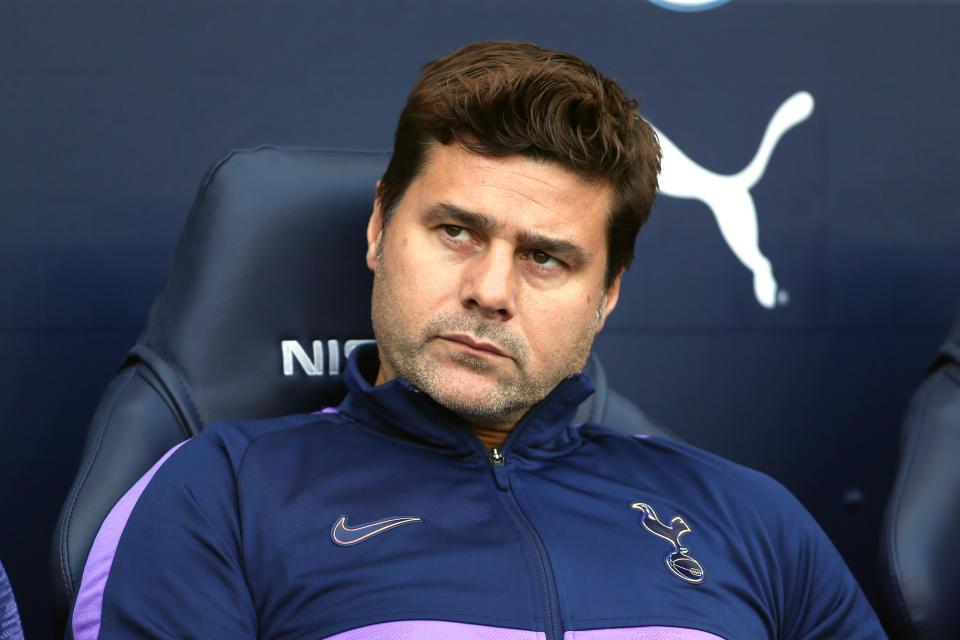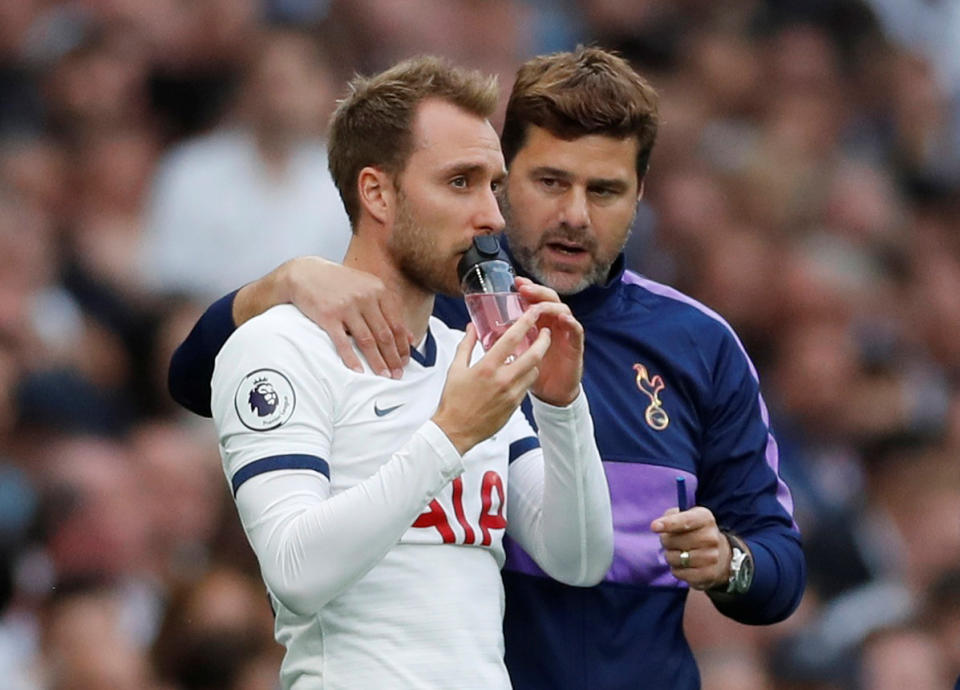Tottenham's issues run deeper than a slow Premier League start
As the 2019-20 season approached, things looked pretty good for Tottenham. Not only had they managed to keep manager Mauricio Pochettino — in spite of numerous reported advances from the likes of Manchester United and Real Madrid—but they had also retained the services of star player Christian Eriksen.
A club that had shirked spending in recent windows had also strengthened the squad with Giovani Lo Celso, Tanguy Ndombele and Ryan Sessegnon. And they would be playing their games in a brand-new stadium that remains the envy of the world.
Having banked four consecutive Premier League top-four finishes, and a Champions League final appearance last season, most pundits expected third place to have Spurs’ name written all over it.
But now, that positivity has somewhat abated.
Pochettino’s side have managed just a single win in their opening three matches, an unconvincing comeback against newly promoted Aston Villa. A surprising home loss against troubled Newcastle last weekend is not the ideal lead-in for Sunday’s pivotal North London Derby.
Here’s a look at Tottenham’s biggest problems right now, starting with their surprising streak of results ...
Spurs have actually been in bad form for a while
While they were securing a place in the Champions League final with an epic display against Ajax, Spurs were in the middle of a paradoxically bad streak of league form, which continues today.
In fact, Tottenham have lost eight of their last 15 Premier League games, picking up just 15 points in that period. Nick Harris of Sporting Intelligence notes that they would be in the relegation zone if the season started 15 matches ago:
Based on the last 15 Premier League games, the bottom 3 would look like this:
18th - Tottenham, 15 points
19th - Brighton, 13 points
20th - Watford, 13 points
What the f*ck is happening at Spurs?!— Footy Accumulators (@FootyAccums) August 27, 2019
That poor form isn’t necessarily exclusive to the league: In their last 21 matches in all competitions, Spurs have won seven while losing eleven.
That’s hardly the form of a European behemoth.
It makes their Champions League run look anomalous; remember that at one point, it looked unlikely they would clear last season’s group stage. It makes their lukewarm start to the season look like business as usual.
Tottenham’s spate of poor form has coincided with one major change at the club: the brand-new stadium. Traditionally, Premier League teams have struggled when moving into shiny new abodes — Southampton, for example, picked up only a single point in their first five matches at St. Mary’s (a trend that changed only after a Pagan witch performed a ritual to lift a purported curse.)
But Spurs actually won their first three home matches at the new digs, and their troubles have generally come away from home. They haven’t won away in the league since a trip to relegation-bound Fulham in January.
Tottenham’s tactical shortcomings
So why has form been so bad? There are numerous factors, but chief among them could be the tactics that Poch has employed — and his reticence to change them.
In the loss to Newcastle, Spurs had 80 percent of possession, but only threatened the Newcastle goal late in the match. They only had two shots on target.
Additionally, The Telegraph highlight a problem with width, as 31 percent of their attacking movements come through the center of the field, a higher proportion than any team in the league.

Tottenham, therefore, have a system that shows a complete lack of firepower and creativity in the final third, along with a lack of width.
Compare that to the likes of Manchester City and Liverpool, whose respective front lines ooze creativity, and who both create a lion’s share of chances from the flanks. Liverpool’s fullbacks finished in the top five in assists last season, while Guardiola’s archetype goal sees the ball crossed low from a wide position for a tap-in.
Against top teams who press high, Spurs have the talent and guile to get results, hence the draw with City 11 days ago and last spring’s Champions League run.
However, against less expressive sides who rely on organized, deep-lying defenses to frustrate bigger teams, they lack what they need to break through.
Against Newcastle, Spurs fans witnessed far too many sideways passes, and not nearly enough of the penetrating forward balls required to get a result.
A lack of creativity, of course, isn’t helped when your most creative player is on the bench.
Spurs players are unsettled
The Premier League’s decision to bring the transfer deadline forward is great in principle, but when the rest of Europe is still trading until September 2, it can prove problematic for sides who know they cannot replace a wantaway player.
Eriksen is reportedly trying to force a move and Spurs have sorely missed his midfield creativity. His introduction from the bench against Aston Villa was quite literally a game-changer, and the Dane has made hopeful substitute appearances in all three Premier League games this season. Poch would likely rather keep Eriksen out of the team until his future is settled, but they cannot afford to keep him out of the action completely.
Eriksen’s contract expires at the end of the season, along with those of Toby Alderweireld and Jan Vertonghen. Personal circumstances vary, but a group of players who are either seeking a new deal, or a move, does not make for dressing-room harmony.
Kieran Tripper admitted that problems behind the scenes were a motivator for his move to Atletico Madrid, while the manager has been forced to publicly come clean about the unrest in his squad.
It’s not possible for an unsettled squad to compete on an elite level. When the European window closes next week and Spurs’ squad is locked in, we will likely see a different atmosphere emerge. But that is not great timing for Sunday’s heated derby with Arsenal.
It’s also worth noting that injuries are playing their part. With Serge Aurier apparently out of favor, Spurs are threadbare at right back, particularly with Kyle Walker-Peters fighting injury. A stand-in fullback will not be ideal to face Pierre-Emerick Aubameyang this weekend.
Recent injuries to Eric Dier, Dele Alli and Harry Winks also haven’t helped squad depth, which may contribute to the next point.

Mauricio Pochettino is unhappy
Before Ole Gunnar Solskjaer was permanently handed the reigns at Old Trafford, Pochettino was constantly linked with the United job. Why would he leave a high-flying Spurs team for a fallen giant that has continued to struggle in the post-Ferguson era?
A bigger budget.
Tottenham are unique among the big clubs for a fiscally responsible approach that saw them bring in no new players last season. And Pochettino has hardly made a secret out of his frustration to get a budget that matches his ambition.
On several occasions, the manager has let his frustration spill into the public domain, most recently in July when he insisted his title should be changed to simply “coach” due to his lack of transfer input.
It is clear that Pochettino has not been 100 percent satisfied with his Tottenham tenure, and that he doesn’t necessarily see eye-to-eye with chairman Daniel Levy.
If the manager is unhappy, logic dictates that his mood will permeate down to his squad. And that’s not good.
Spurs have been overperforming for sometime
Unlike other “Big Six” sides, Spurs do not roll the dice on record-breaking transfers. They have the cheapest wage bill among the top teams — it is believed that the only players who earn more than $122,000 per week are Harry Kane and Son Heung-min.
The only way they have managed to keep their squad together is the fact that they collectively bat above their average.
Frankly, given their relatively modest spending, it is quite incredible that they have managed to deliver four consecutive top-four finishes and a Champions League final — all while funding a very expensive new stadium.
For that, Pochettino deserves a huge amount of praise. It’s why a manager with no major silverware is in such high demand.
Spurs have successfully altered the dynamic in North London, but in order to avoid regression to the mean, perhaps they need break their financial model.
Make the funds available for big-money signings. Make big contract offers to the likes of Christian Eriksen that compel them to stop searching for property in Madrid.
Pochettino has worked miracles, but he can only keep overperforming for so long.
More from Yahoo Sports:


